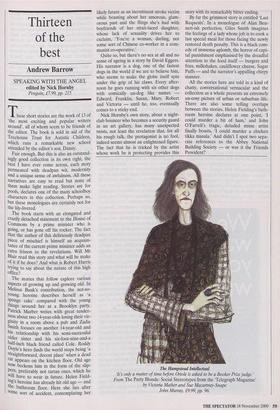Thirteen of the best
Andrew Barrow
SPEAKING WITH THE ANGEL edited by Nick Hornby Penguin, £7.99, pp. 215 These short stories are the work of 13 of The most exciting and popular writers around', all of whom seem to be friends of the editor. The book is sold in aid of the Treehouse Trust for Autistic Children, which runs a remarkable new school attended by the editor's son, Danny. Fair enough. But this is also an outstand- ingly good collection in its own right, the best I have ever come across, each story permeated with deadpan wit, modernity and a unique sense of awfulness. All these narratives are easy to read but none of them make light reading. Stories are for poofs, declares one of the many schoolboy characters in this collection. Perhaps so, but these monologues are certainly not for the lily-livered.
The book starts with an elongated and crazily detached statement to the House of Commons by a prime minister who is going, or has gone off his rocker. The fact that the author of this deliriously deadpan piece of mischief is himself an acquain- tance of the current prime minister adds an extra frisson to the revelations. Will Mr Blair read this story and what will he make of it if he does? And what is Robert Harris trying to say about the nature of this high office?
The stories that follow explore various aspects of growing up and growing old. In Melissa Bank's contribution, the not-so- Young heroine describes herself as 'a sponge cake' compared with the young things around her at a Brooklyn party. Patrick Marber writes with great tender- ness about two 14-year-olds losing their vir- ginity in a room above a pub and Zadie Smith focuses on another 14-year-old and his relationship with his semi-successful older sister and his six-foot-nine-and-a half-inch black friend called Cole. Roddy Doyle's hero finds the world stops being 'a straightforward, decent place' when a dead rat appears on the kitchen floor. Old age now beckons him in the form of the slip- pers, preferably not tartan ones, which he Will have to wear in future. Helen Field- ing's heroine has already hit old age — and the bathroom floor. Here she lies after some sort of accident, contemplating her likely future as an incontinent stroke victim while boasting about her amorous, glam- orous past and the flings she's had with boyfriends of her strait-laced daughter, whose lack of sexuality drives her to exclaim, 'You're a woman, darling, not some sort of Chinese co-worker in a com- munist co-operative.'
Quite so, but there's no sex at all and no sense of ageing in a story by David Eggers. His narrator is a dog, one of the fastest dogs in the world if we are to believe him, who seems to make the globe itself spin under the grip of his claws. Every after- noon he goes running with six other dogs with comically un-dog like names Edward, Franklin, Susan, Mary, Robert and Victoria — until he, too, eventually comes to a sticky end.
Nick Hornby's own story, about a night- club bouncer who becomes a security guard in an art gallery, has many unexpected twists, not least the revelation that, for all his rough talk, the protagonist is no fool, indeed seems almost an enlightened figure. The fact that he is tricked by the artist whose work he is protecting provides this story with its remarkably bitter ending.
By far the grimmest story is entitled 'Last Requests'. In a monologue of Alan Ben- nett-ish perfection, Giles Smith imagines the feelings of a lady whose job is to cook a last special meal for those facing the newly restored death penalty. This is a black com- edy of immense aplomb, the horror of capi- tal punishment emphasised by the dreadful attention to the food itself — burgers and fries, milkshakes, cauliflower cheese, Sugar Puffs — and the narrator's appalling chirpy manner.
All the stories here are told in a kind of chatty, conversational vernacular and the collection as a whole presents an extremely un-cosy picture of urban or suburban life. There are also some telling overlaps between the stories. Helen Fielding's bath- room heroine declares at one point, 'I could murder a bit of ham,' and John O'Farrell's tragic, deluded mime artist finally boasts, 'I could murder a chicken tikka masala.' And didn't I spot two sepa- rate references to the Abbey National Building Society — or was it the Friends Provident?


































































































 Previous page
Previous page